雅思阅读-文化冲击
culture shock阅读理解
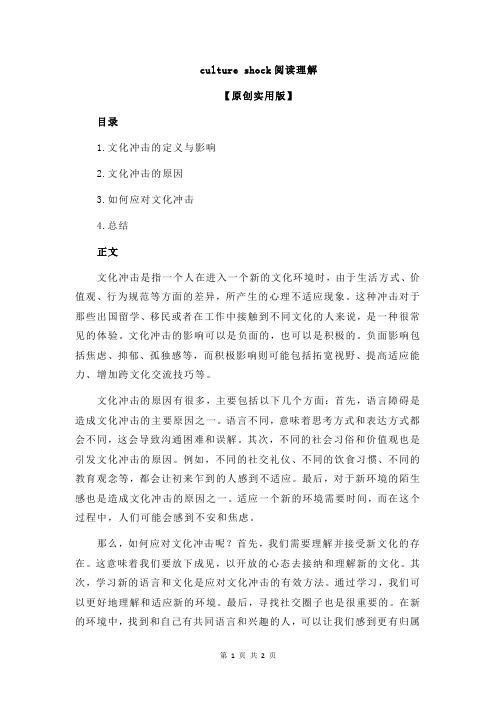
culture shock阅读理解
【原创实用版】
目录
1.文化冲击的定义与影响
2.文化冲击的原因
3.如何应对文化冲击
4.总结
正文
文化冲击是指一个人在进入一个新的文化环境时,由于生活方式、价值观、行为规范等方面的差异,所产生的心理不适应现象。
这种冲击对于那些出国留学、移民或者在工作中接触到不同文化的人来说,是一种很常见的体验。
文化冲击的影响可以是负面的,也可以是积极的。
负面影响包括焦虑、抑郁、孤独感等,而积极影响则可能包括拓宽视野、提高适应能力、增加跨文化交流技巧等。
文化冲击的原因有很多,主要包括以下几个方面:首先,语言障碍是造成文化冲击的主要原因之一。
语言不同,意味着思考方式和表达方式都会不同,这会导致沟通困难和误解。
其次,不同的社会习俗和价值观也是引发文化冲击的原因。
例如,不同的社交礼仪、不同的饮食习惯、不同的教育观念等,都会让初来乍到的人感到不适应。
最后,对于新环境的陌生感也是造成文化冲击的原因之一。
适应一个新的环境需要时间,而在这个过程中,人们可能会感到不安和焦虑。
那么,如何应对文化冲击呢?首先,我们需要理解并接受新文化的存在。
这意味着我们要放下成见,以开放的心态去接纳和理解新的文化。
其次,学习新的语言和文化是应对文化冲击的有效方法。
通过学习,我们可以更好地理解和适应新的环境。
最后,寻找社交圈子也是很重要的。
在新的环境中,找到和自己有共同语言和兴趣的人,可以让我们感到更有归属
感和安全感。
culture shock阅读理解
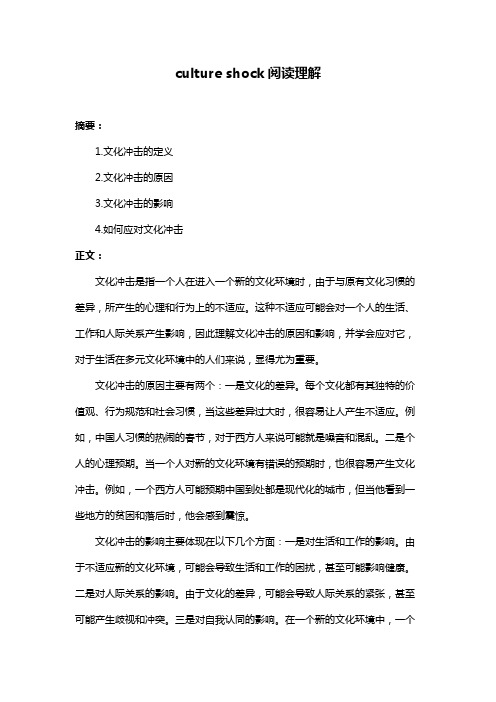
culture shock阅读理解摘要:1.文化冲击的定义2.文化冲击的原因3.文化冲击的影响4.如何应对文化冲击正文:文化冲击是指一个人在进入一个新的文化环境时,由于与原有文化习惯的差异,所产生的心理和行为上的不适应。
这种不适应可能会对一个人的生活、工作和人际关系产生影响,因此理解文化冲击的原因和影响,并学会应对它,对于生活在多元文化环境中的人们来说,显得尤为重要。
文化冲击的原因主要有两个:一是文化的差异。
每个文化都有其独特的价值观、行为规范和社会习惯,当这些差异过大时,很容易让人产生不适应。
例如,中国人习惯的热闹的春节,对于西方人来说可能就是噪音和混乱。
二是个人的心理预期。
当一个人对新的文化环境有错误的预期时,也很容易产生文化冲击。
例如,一个西方人可能预期中国到处都是现代化的城市,但当他看到一些地方的贫困和落后时,他会感到震惊。
文化冲击的影响主要体现在以下几个方面:一是对生活和工作的影响。
由于不适应新的文化环境,可能会导致生活和工作的困扰,甚至可能影响健康。
二是对人际关系的影响。
由于文化的差异,可能会导致人际关系的紧张,甚至可能产生歧视和冲突。
三是对自我认同的影响。
在一个新的文化环境中,一个人可能会对自己的文化身份产生质疑,这可能会对他的自我认同产生影响。
那么,如何应对文化冲击呢?首先,我们需要理解并接受文化差异。
每个文化都有其存在的理由,我们应尊重并理解它们。
其次,我们需要调整我们的心理预期。
我们应以开放的心态去接受新的文化环境,而不是抱有过高的期待。
最后,我们需要积极地融入新的文化环境。
只有通过积极的互动和交流,我们才能更好地适应新的文化环境。
关于中国文化冲击英语作文
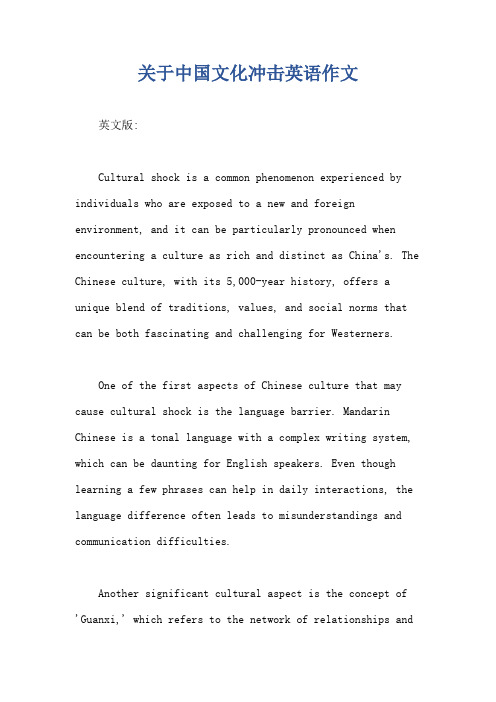
关于中国文化冲击英语作文英文版:Cultural shock is a common phenomenon experienced by individuals who are exposed to a new and foreign environment, and it can be particularly pronounced when encountering a culture as rich and distinct as China's. The Chinese culture, with its 5,000-year history, offers a unique blend of traditions, values, and social norms that can be both fascinating and challenging for Westerners.One of the first aspects of Chinese culture that may cause cultural shock is the language barrier. Mandarin Chinese is a tonal language with a complex writing system, which can be daunting for English speakers. Even though learning a few phrases can help in daily interactions, the language difference often leads to misunderstandings and communication difficulties.Another significant cultural aspect is the concept of 'Guanxi,' which refers to the network of relationships andconnections that play a crucial role in Chinese society. It is a system that values personal relationships over individual achievements and can be confusing for those accustomed to the more individualistic Western culture.The concept of 'face' or 'Mianzi' is also central to Chinese culture. It involves maintaining one's reputation and dignity in social interactions, and it can influence behavior in various ways. For example, public criticism is avoided, and indirect communication is often preferred to save face.Social etiquette in China also differs from Western norms. For instance, the practice of giving and receiving business cards with both hands and the importance of seniority in social settings are customs that may seem unusual to foreigners.Food is another area where cultural differences are evident. Chinese cuisine is diverse and often involves flavors and ingredients that are unfamiliar to Western palates. The practice of sharing dishes and the use ofchopsticks can also be a new experience for many.Lastly, the Chinese approach to time can be a source of cultural shock. The Chinese concept of time is morecircular and less linear than in the West, which can lead to different attitudes towards punctuality and scheduling.In conclusion, the cultural shock experienced when encountering Chinese culture is multifaceted, involving language, social norms, and values. It requires patience, open-mindedness, and a willingness to learn and adapt. Embracing these differences can lead to a deeper understanding and appreciation of the rich cultural tapestry that is China.中文版:文化冲击是一个常见的现象,尤其是当人们接触到一个全新且陌生的环境时。
文化冲击四个阶段英文作文
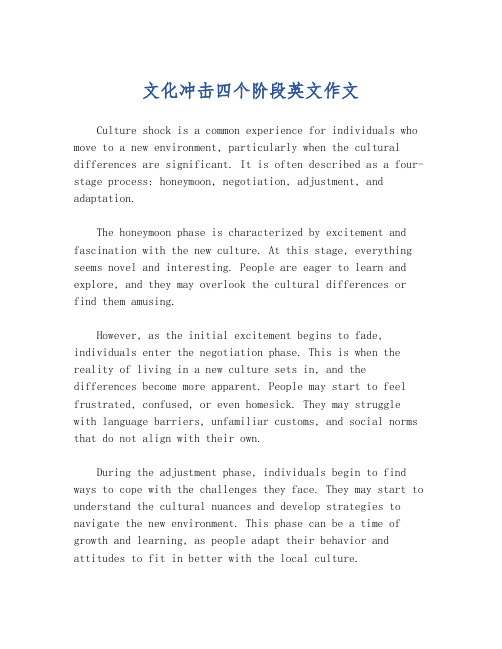
文化冲击四个阶段英文作文Culture shock is a common experience for individuals who move to a new environment, particularly when the cultural differences are significant. It is often described as a four-stage process: honeymoon, negotiation, adjustment, and adaptation.The honeymoon phase is characterized by excitement and fascination with the new culture. At this stage, everything seems novel and interesting. People are eager to learn and explore, and they may overlook the cultural differences or find them amusing.However, as the initial excitement begins to fade, individuals enter the negotiation phase. This is when the reality of living in a new culture sets in, and the differences become more apparent. People may start to feel frustrated, confused, or even homesick. They may struggle with language barriers, unfamiliar customs, and social norms that do not align with their own.During the adjustment phase, individuals begin to find ways to cope with the challenges they face. They may start to understand the cultural nuances and develop strategies to navigate the new environment. This phase can be a time of growth and learning, as people adapt their behavior and attitudes to fit in better with the local culture.Finally, the adaptation phase is reached when individuals feel comfortable and at ease in their new cultural setting. They have developed a sense of belonging and can appreciate the beauty and richness of the new culture. They have integrated the new cultural elements into their own identity and can function effectively within the society.In conclusion, culture shock is a natural part of the process of adapting to a new culture. It is important to be aware of these stages and to approach them with an open mind and a willingness to learn. Embracing the challenges and opportunities that come with living in a different culture can lead to a rewarding and enriching experience.。
文化冲击话题英语作文

文化冲击话题英语作文英文回答:Culture shock is a common experience for people who travel or move to a new country. It occurs when individuals are suddenly confronted with a culture that is different from their own, and they may feel disoriented, anxious, or even frustrated as they try to navigate the new cultural norms and expectations. I have personally experienced culture shock when I moved to China for a year to study abroad.One of the biggest culture shocks for me was the concept of "saving face" in Chinese culture. In the West, it is often encouraged to express our thoughts and feelings openly, even if it means disagreeing with others. However, in Chinese culture, it is important to maintain harmony and avoid causing embarrassment or shame to others. I remember a time when I made a suggestion in a group setting, and instead of receiving feedback or discussion, everyonesimply nodded and smiled. It took me a while to realizethat my suggestion was not well-received, but no one wanted to openly disagree with me to avoid causing conflict.Another aspect of culture shock for me was the dining etiquette. In China, it is common to share dishes and take small portions from each dish onto your own plate. Coming from a culture where personal space and individual portions are valued, I found it uncomfortable at first to haveothers serving food onto my plate without asking. It tookme some time to adjust and understand that this was a signof generosity and hospitality in Chinese culture.中文回答:文化冲击是一个常见的经历,当人们旅行或搬到一个新的国家时,他们突然面对一个与自己文化不同的文化,他们可能会感到迷茫、焦虑,甚至是沮丧,因为他们试图适应新的文化规范和期望。
关于文化冲击英语作文
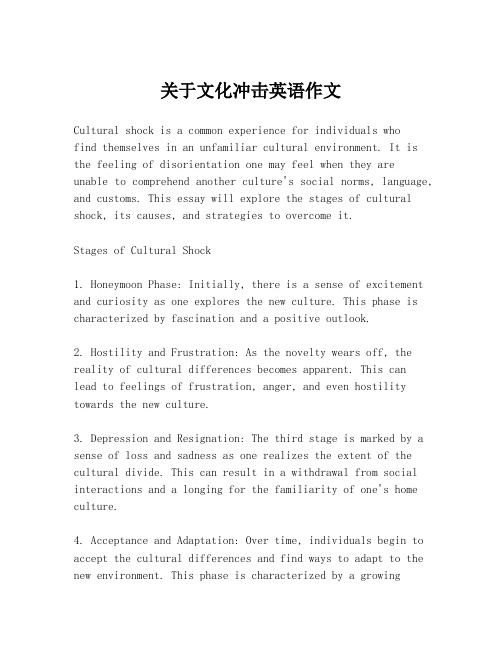
关于文化冲击英语作文Cultural shock is a common experience for individuals whofind themselves in an unfamiliar cultural environment. It is the feeling of disorientation one may feel when they are unable to comprehend another culture's social norms, language, and customs. This essay will explore the stages of cultural shock, its causes, and strategies to overcome it.Stages of Cultural Shock1. Honeymoon Phase: Initially, there is a sense of excitement and curiosity as one explores the new culture. This phase is characterized by fascination and a positive outlook.2. Hostility and Frustration: As the novelty wears off, the reality of cultural differences becomes apparent. This canlead to feelings of frustration, anger, and even hostility towards the new culture.3. Depression and Resignation: The third stage is marked by a sense of loss and sadness as one realizes the extent of the cultural divide. This can result in a withdrawal from social interactions and a longing for the familiarity of one's home culture.4. Acceptance and Adaptation: Over time, individuals begin to accept the cultural differences and find ways to adapt to the new environment. This phase is characterized by a growingappreciation for the host culture and a sense of belonging.Causes of Cultural ShockCultural shock can be attributed to several factors:- Language Barrier: Difficulty in communication can lead to misunderstandings and feelings of isolation.- Social Norms: Different social behaviors and etiquette canbe confusing and may lead to unintentional offense.- Lack of Familiarity: The absence of familiar routines and environments can cause anxiety and stress.- Homesickness: Missing family, friends, and the comforts of home can exacerbate feelings of cultural dissonance.Strategies to Overcome Cultural Shock1. Education: Learning about the new culture before arrival can help prepare for the differences and reduce the shock.2. Open-mindedness: Being open to new experiences and willing to adapt can ease the transition.3. Social Interaction: Engaging with locals and other expatriates can provide support and insights into the culture.4. Self-Care: Taking care of one's physical and mental health is crucial during this challenging time.In conclusion, cultural shock is a complex phenomenon that affects many aspects of an individual's life. Byunderstanding its stages, causes, and learning strategies to cope with it, one can navigate the challenges of living in a new cultural environment more effectively. It is anopportunity for personal growth and a deeper understanding of the world's diversity.。
文化冲击中英文作文
文化冲击中英文作文1. Culture shock is a common phenomenon for people who travel or move to a different country. It happens when someone is exposed to a culture that is different fromtheir own and they experience confusion, disorientation, and even anxiety. This can be caused by differences in language, customs, values, and social norms. Culture shock can be a challenge to overcome, but it can also be an opportunity to learn and grow.2. One of the biggest challenges of culture shock is the language barrier. When someone is in a new environment where they don't speak the language, it can be difficult to communicate and understand what is going on around them. This can lead to feelings of frustration and isolation. However, learning a new language can be a rewarding experience and can help break down barriers between cultures.3. Another challenge of culture shock is adjusting todifferent customs and social norms. For example, in some cultures it is considered rude to be on time, while in others it is expected. In some cultures, it is customary to greet someone with a kiss on the cheek, while in others a handshake is more appropriate. These differences can be confusing and may take some time to get used to.4. Values can also vary greatly between cultures, and this can cause culture shock. For example, in some cultures, individualism is highly valued, while in others,collectivism is more important. This can affect everything from the way people interact with each other to the waythey approach work and education. Understanding these differences can help reduce culture shock and promotecross-cultural understanding.5. Finally, culture shock can be exacerbated by homesickness and feelings of nostalgia for one's own culture. It can be difficult to adjust to a new culture and leave behind the familiar comforts of home. However, it is important to remember that culture shock is a normal partof the process of adapting to a new environment, and thatwith time and effort, it is possible to overcome it and embrace the new culture.。
cultureshock
cultureshockC u l t u r e S h o c k -CAL-FENGHAI-(2020YEAR-YICAI)_JINGBIANUNIT 6:Culture Shock|文化冲击|Kalervo ObergWe might almost call culture shock an occupational disease of people who have been suddenly transplanted abroad. Like most ailments it has its own cause, symptoms, and cure.1 我们不妨把文化冲击称为突然置身国外的人们所得的职业病。
和大部分疾病一样,这种病有其独特的起因、症状和疗法。
Culture shock is precipitated by the anxiety that results from losing all our familiar signs and symbols of social intercourse. These signs or cues include the thousand and one ways in which we orient ourselves to the situations of daily life: when to shake hands and what to say when we meet people, when and how to give tips, how to give orders to servants, how to make purchases, when to accept and when to refuse invitations, when to take statements seriously and when not. These cues which may be words, gestures, facial expressions, customs, or norms are acquired by all of us in the course of growing up and are as much a part of our culture as the language we speak or the beliefs we accept. All of usdepend for our peace of mind and our efficiency on hundreds of these cues.2 文化冲击是因为我们失去熟悉的社会交往标记和符号而产生的焦虑所促成。
文化冲击的英语作文
文化冲击的英语作文Cultural Impact。
Cultural impact refers to the influence that oneculture has on another. With the increasing globalization and interconnectedness of societies, cultural impact has become more prevalent and significant. It can be seen in various aspects, including language, traditions, beliefs, values, and even fashion and entertainment. In this essay, we will explore the concept of cultural impact and its implications.One of the most prominent examples of cultural impactis the spread of the English language. English has become a global lingua franca, used for communication in various fields such as business, academia, and tourism. This phenomenon is largely attributed to the historical and cultural influence of the British Empire and the United States. As a result, English has become an essential skill for individuals seeking to thrive in the globalized world.However, the dominance of English has also led to the erosion of indigenous languages and cultures in some regions, raising concerns about linguistic and cultural diversity.Another significant cultural impact is the diffusion of Western values and lifestyles. Western ideals of individualism, consumerism, and democracy have spread around the world through media, technology, and globalization. This has led to both positive and negative consequences. On the positive side, Western values have promoted personal freedom, human rights, and genderequality in many societies. On the negative side, the adoption of Western lifestyles has also resulted in the loss of traditional values and cultural identities. Additionally, the Western influence on beauty standards has led to the rise of body image issues and the global beauty industry.Furthermore, cultural impact can be observed in the realm of traditions and customs. As societies interact and exchange ideas, traditions and customs are often borrowed,adapted, or even replaced. For example, the celebration of Halloween, originally a Celtic festival, has become popular in many countries, even those without historical connections to the festival. Similarly, the popularity of Japanese anime and Korean K-pop music has transcended national boundaries and gained a global following. These examples demonstrate how cultural impact can shape and reshape traditions and entertainment.In conclusion, cultural impact is a complex and multifaceted phenomenon that occurs in various aspects of society. It can be both beneficial and detrimental, depending on the context and perspective. As the world continues to become more interconnected, it is essential to promote cultural diversity and mutual understanding while embracing the positive aspects of cultural impact. By doing so, we can foster a global society that appreciates and respects the richness and uniqueness of each culture.。
culture shock阅读理解
culture shock阅读理解
摘要:
1.文化冲击的定义和背景
2.文化冲击的表现形式
3.如何应对文化冲击
4.文化冲击对我们的影响和启示
正文:
文化冲击是指在一个新的文化环境中,人们由于不熟悉当地的风俗习惯、价值观和行为规范,而产生的一种困惑、紧张和焦虑的心理状态。
随着全球化的加速推进,越来越多的人需要面对文化冲击。
本文将分析文化冲击的表现形式,探讨如何应对文化冲击,并思考文化冲击对我们的影响和启示。
文化冲击的表现形式有很多,比如在饮食方面,不习惯当地的食物可能会让人食欲不振;在社交方面,不理解当地人的沟通方式可能导致误解和冲突;在生活方面,不适应当地的居住条件和基础设施可能会影响生活质量。
此外,文化冲击还可能表现为对当地文化和价值观的不认同,从而产生心理压力。
要应对文化冲击,首先需要保持开放的心态,尊重当地的文化和习俗。
我们应该尽量了解当地的文化背景,学会换位思考,理解当地人的行为动机。
其次,要积极参与当地的社交活动,结交新朋友,增加与当地人的互动,从而提高自己的社交能力。
此外,我们还应该学会调整自己的期望值,避免将本国的生活方式和价值观强加于新的文化环境中。
文化冲击对我们的影响和启示是多方面的。
首先,文化冲击使我们认识到
世界文化的多样性,从而培养我们尊重和包容不同文化的品质。
其次,文化冲击锻炼了我们的适应能力,使我们能够在不同的文化环境中迅速找到生存之道。
最后,文化冲击使我们更加珍惜本国的文化传统,激发我们传承和弘扬民族文化的精神。
总之,文化冲击是全球化时代不可避免的现象。
- 1、下载文档前请自行甄别文档内容的完整性,平台不提供额外的编辑、内容补充、找答案等附加服务。
- 2、"仅部分预览"的文档,不可在线预览部分如存在完整性等问题,可反馈申请退款(可完整预览的文档不适用该条件!)。
- 3、如文档侵犯您的权益,请联系客服反馈,我们会尽快为您处理(人工客服工作时间:9:00-18:30)。
Culture ShockThis reading test contains 10 questions. You should spend about 20 minutes on this task. To make it more authentic, download the test and do it with pen and paper.Read the passage below and answer questions 1-10.What you need to know about Culture ShockMost people who move to a foreign country or culture may experience a period of time when they feel very homesick and have a lot of stress and difficulty functioning in the new culture. This feeling is often called‘culture shock’ and it is important to understand and learn how to cope with culture shock if you are to adapt successfully to your new home’s culture.First of all, it’s important to know that culture shock is nor mal. Everyone in a new situation will go through some form of culture shock, and the extent of which they do is determined by factors such as the difference between cultures, the degree to which someone is anxious to adapt to a new culture and the familiarity that person has to the new culture. If you go, for example, to a culture that is far different from your own, you’re likely to experience culture shock more sharply than those who move to anew culture knowing the language and the behavioural norms of the new culture.There are four general stages of cultural adjustment, and it is important that you are aware of these stages and can recognise which stage you are in and when so that you will understand why you feel the way you do and that any difficulties you are experience are temporary, a process you are going through rather than a constant situation.The first stage is usually referred to as the excitement stage or the‘honeymoon’ stage. Upon arriving in a new environment, you’ll be interested in the new culture, everything will seem exciting, everyone will seem friendly and helpful and you’ll be overwhelmed with impressions. During this stage you are merely soaking up the new landscape, taking in these impressions passively, and at this stage you have little meaningful experience of the culture.But it isn’t long before the honeymoon stage dissolves into the second stage – sometimes called the withdrawal stage. The excitement you felt before changes to frustration as you find it difficult to cope with the problems that arise. It seems that everything is difficult, the language is hard to learn, people are unusual and unpredictable, friends are hard to make, and simple things like shopping and going to the bank are challenges. It is at this stage that you are likely to feel anxious andhomesick, and you will probably find yourself complaining about the new culture or country. This is the stage which is referred to as ‘culture shock’.Culture shock is only temporary, and at some point, if you are one oftho se who manage to stick it out, you’ll transition into the third stage of cultural adjustment, the ‘recovery’ stage. At this point, you’ll have a routine, and you’ll feel more confident functioning in the new culture. You’ll start to feel less isolated as y ou start to understand and accept the way things are done and the way people behave in your new environment. Customs and traditions are clearer and easier to understand. At this stage, you’ll deal with new challenges with humour rather than anxiety.The la st stage is the ‘home’ or ‘stability’ stage – this is the point when people start to feel at home in the new culture. At this stage, you’ll function well in the new culture, adopt certain features and behaviours from your new home, and prefer certain aspects of the new culture to your own culture.There is, in a sense, a fifth stage to this process. If you decide to return home after a long period in a new culture, you may experience what is called ‘reverse culture shock’. This means that you may find aspec ts of your own culture ‘foreign’ because you are so used to the new culture that you have spent so long adjusting to. Reverse culture shock is usuallypretty mild – you may notice things about your home culture that you had never noticed before, and some of the ways people do things may seem odd. Reverse culture shock rarely lasts for very long.QuestionsDo the following statements agree with the information given in the article?In boxes 1-10 on your answer sheet writeTRUE if the statement agrees with the informationFALSE if the statement contradicts the informationNOT GIVEN if there is no information on this1) Some people will find the process of adapting to a new country easier than others.2) Knowing about these four stages will help people adjust to a new culture more quickly.3) People can ease culture shock by learning about the language and customs before they go to the new culture.4) Culture shock is another name for cultural adjustment.5) The first stage is usually the shortest.6) In the first stage, people will have a very positive impression of the new culture.7) Many people will leave the new culture while they are in the second stage.8) By the third stage, people do not experience any more problems with the new culture.9) In the fourth stage, people speak new language fluently.10) Reverse culture shock is as difficult to deal with as culture shock.参考答案Answers1) TRUE2) NOT GIVEN3) TRUE4) FALSE5) NOT GIVEN6) TRUE7) NOT GIVEN8) FALSE9) NOT GIVEN10) FALSE。
